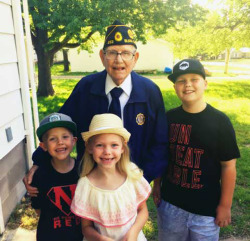At that time the disciples came to Jesus and asked, “Who, then, is the greatest in the kingdom of heaven?” ~Matthew 18:1
 We all want to be the best. Whether it is in sports, at work, at school or in life, we want to excel. We want people to notice us. We want to leave a mark.
We all want to be the best. Whether it is in sports, at work, at school or in life, we want to excel. We want people to notice us. We want to leave a mark.
Last week I got to spend a few days with my grandfather-in-law, Earl Buckley, in Mankato, Kansas. If you have never heard of that town, I am not surprised. It doesn’t even make a blip on a radar screen. For those who know the TV show, The Andy Griffith Show and its town of Mayberry, Mankato isn’t that big, but life still runs about the same.
Earl has lived in Kansas almost all his life, except for the time he spent in the Navy during the Korean War. He is a man who has no worldly recognition, nor does he seek it. He has lived a pretty simple life compared to some, yet to be around him you know you are in the presence of a great man.
Earl has been involved in his church his entire life. He is a Gideon, and despite the fact that he has a hard time getting around, he spent Memorial Day weekend driving (with my wife and children) around to small country cemeteries decorating tombstones of family members and those for which no family remains.
But that doesn’t even begin to scratch the surface. Earl was a farmer. He planted and farmed his own land, and when that wasn’t enough to keep his family going, he went to harvesting other’s land; from southern Kansas all the way up to North Dakota. In addition, he began working in construction and has a book filled with pictures of all of the buildings he put up in his town and the surrounding area. He did a lot of this until just a few years ago when he was encouraged to take it easy.
It wasn’t just that Earl was getting older and shouldn’t be driving a combine anymore, although that was one of the reasons. It was not common for him to spend a week or two bringing in a crop and get paid in homemade pies or some other form of barter. And I am not talking about all-you-can-eat-for-a-year pie; just a pie or two. When questioned by his family he would say, “Well, they don’t have much and I have a combine just sittin’ here. So what else am I going to do?” For Earl, to help someone, even at the detriment to himself, is always more important. Even at 87 and having an increasingly difficult time hearing, seeing and keeping his balance, he is out in his community trying to help others. It is just who he is…or from another perspective, it is who Christ has made him.
When the disciples asked Jesus, “Who is the greatest in heaven?”, they were probably expecting to hear names like Moses, Elijah, King David, or maybe Sampson, Abraham or Debra. They were seeking to be on that list. James and John even go so far to ask Jesus if they can sit at his right and left hand in heaven, a place only reserved for the most honored of people. Yet this is not the answer that Jesus gives them. Jesus says to them, “Truly I tell you, unless you change and become like little children, you will never enter the kingdom of heaven. Therefore, whoever takes the lowly position of this child is the greatest in the kingdom of heaven. And whoever welcomes one such child in my name welcomes me.”
Children in Jesus’ time were not like children today. Parents didn’t schedule their lives around activities, they didn’t make play dates for them. Children were of little to no value; unless you were the oldest boy, who would be the heir to the house. For Jesus to make such a comment was to change the perspective on what it means to be great. Greatness was no longer something to aspire to, it wasn’t something that meant gaining an attribute or accolade in some way, but instead was something of a taking away. It was the removal of pride, the ousting of arrogance, it was the lowering of brow, the humbleness of heart and the innocent hunger of the child to please and serve. Jesus’ definition stands in opposition to the world’s.
You might think to yourself, “Sure, that’s what people are like in a small town” or “Earl is just from a different generation,” but is that it? I think not. When I sit with Earl I see someone who does his best to live out the gospel message. And the reality is, when his earthly journey is over, his death will go unnoticed by most of the world. But to those who know and love him, a gentle tear will appear on their hearts stitched up by the promise of eternal life through Christ. And I guarantee you that heaven will rejoice in his presence…








